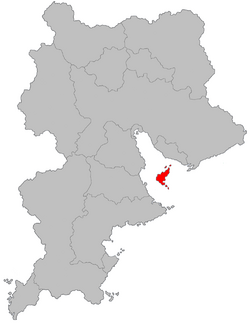Aeolia
This article is incomplete because it is pending further input from participants, or it is a work-in-progress by one author. Please comment on this article's talk page to share your input, comments and questions. Note: To contribute to this article, you may need to seek help from the author(s) of this page. |
Republic of Aeolia
| |
|---|---|
| Motto(s): Pax tibi Marce, evangelista meus "Peace be to you Mark, my evangelist" | |
 | |
| Country | Etruria |
| Status | Constituent state within a Federation |
| Annexation in Etruria | 1786 |
| Constituent State | 1889 |
| Capital | Porto di Sotirio |
| Government | |
| • Type | Parliamentary republic in a federation |
| • Body | State Assembly |
| • Prefect of State | Luciano Giustiniani (MT) |
| • Deputy Prefect | Serenella Capri (MT) |
| Area | |
| • Total | 12,348.31 km2 (4,767.71 sq mi) |
| Population (2020) | |
| • Total | |
| • Density | 91.39/km2 (236.7/sq mi) |
| Demonym | Aeolian |
| GDP | |
| • Total | $ million |
| • Per capita | $ |
| Area code | +101 |
| Official languages | Vespasian |
| Patron saint | Saint Mark |
Aeolia, officially, the Republic of Aeolia (Vespasian: Repubblica Eolia; Povelian: Repùblega de Eolia) is an island located in the Bay of Povelia and is a constituent state of the United Etrurian Federation, it is comprised of several islands, the largest being Aeolia, followed by Santa Eufemia, San Carlo, Ogliastra and Tavolara. The state is separated from the Etrurian mainland via the Straits of Accadia located 89 miles to the east. At 12,348.31 km2 (4,767.71 sq mi) it is the second smallest state in Etruria, ahead of Il Dogado. Its capital and largest city is Porto di Sotirio, and the total population is estimated to 1.128 million.
The islands have been inhabited by humans since the paleolithic, evidence of an organised civilisation has been regularly documented with monolithic sites dated to as early as 10,000 BC. This civilisation would prosper until around 700 BC when the islands were colonised by Classical Piraea, they would see numerous Piraean colonies and infrastructure built which effectively ended the existence of the Pre-Piraean civilisation. Under Piraean control, the island would also serve as a major maritime hub for Piraea's network of cities and outposts across the Solarian Sea and Acheolian Sea. In 215 BC, using instability in Piraea as justification, the Solarian Republic seized control of Aeolia and its smaller islands and incorporated the archepelago as a Provinicia Senatoria. The island's rich soil and copper deposits were rapidly exploited by the Solarians, the island was also significantly militarised by the Solarians, with a large number of shipyards and castras constructed.
Following the collapse of the Solarian Empire, the island fell under the control of local Solarian officials who moved to establish the Duchy of Aeolia in 477 AD, however, its independence would be short-lived with the expansion of the Verliquoian Empire, which seized much of coastal Etruria. The island would remain under Verliquoian control until it was ceded to the newly independent Republic of Andora in 1098, however, this would later bring conflict to the islands as Andora struggled to maintain control against the Exalted Republic of Povelia. In 1304, the Aeolian War resulted in the complete annexation of the archepelago into Povelia which in turn constructed a number of fortresses and harbours to protect the maritime entry into the Bay of Povelia. Aeolia would serve a prominent role within the Povelian dominated trade network across the Solarian and Acheolian Seas, leaving a permament linguistic and archtitectural legacy. Aeolia is the only other state in Etruria to speak the Povelian dialect of Vespasian besides Veratia and Il Dogado. Under Povelian rule, the island would occassionally suffer raids by the Gorsanid Empire and Tsabaran corsairs. In 1786, the island alongside Povelian Republic was annexed into the Etrurian First Republic, it would be the sight of the Battle of Ceres Point in 1787. Many revolutionary leaders, including Francesco Cassio Cacciarelli were exiled to the island following the Caltrini restoration in 1810.
Today, Aeolia is a popular tourist destination and is a major hub for the Etrurian Defence Force, including the Piastra Training Grounds, Castelvetrano naval base, Porto di Sotirio Arsenal and its historical hosting of the Poseidone anchorage.
Etymology
There is debate as to whether the name Aeolia is derived from Aeolus, the son of Poseidon or from a local myth produced by Piraean colonists prior to the Solarian Conquest. Several Piraean writers and historians also mark that the island was known as Aeolia throughout Classic Piraea's rule, though they do not confirm which Aeolus is the namesake. Solarian writers such as Quintius supports the argument that the island received its name from the local mythological figure, "Aeolus Watcher upon the Wind", a figure who reportedly became the patron of the warm winds that buffer the islands during summertime. Conversely, Valencius Valens during his writing of "Histories of the Provinces" claimed the Piraeans colonised the island and dedicated its "terrain to Aeolus, Prince of the Sea and Son of Posdeidon." The discovery of a large temple complex - dedicated to Poseidon and Aeolus - near Castelvetrano in 1878 has led modern historians to argue that Poseidon's son is most likely the namesake.
During the course of the Etrurian Second Republic, Greater Solarian Republic and the 1970s, many developments and constructions were named in alignment to the ancient Piraean pantheon in respect to the islands' namesake.

